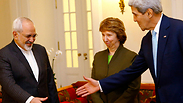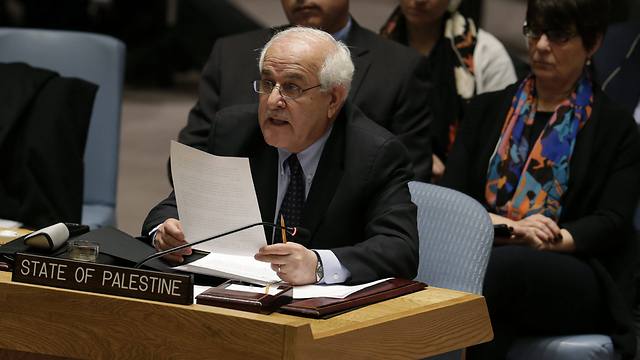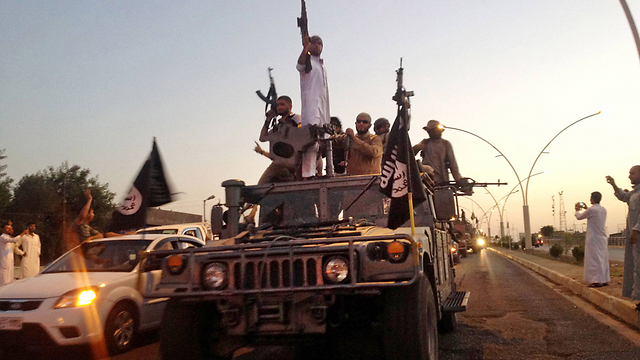
Iranian nuclear talks will continue till their new deadline, June 2015
צילום: רויטרס
What strategic challenges does 2015 hold for Israel?
Analysis: The Islamic State, which some people predicted would wash over the region like a huge unstoppable wave, has been curbed; the most serious potential threat was and remains Iran's nuclearization.
The year 2014 has come to an end with a strategic tie on the main fronts Israel is dealing with.

On the Iranian front, the nuclear program has been frozen. The diplomatic process vis-à-vis the international community is still in a stalemate.
Despite Israeli concerns that a bad deal would be reached, that the sanctions regime would collapse or that the Iranians would make a secret breakthrough towards a nuclear bomb, the civil year ended without a change.
On the Palestinian front, another ambitious American attempt to solve the conflict failed, leaving the Israelis and the Palestinians in a status quo which also reflects a strategic tie.
The battle against Hamas this past summer ended without a real military or political change either. So far, the fears of an intifada in the Palestinian Authority territories or in Jerusalem have also proved to be false.
On the northern front, the bloody civil war in Syria has reached a strategic tie between the regime and the rebels. While Syrian President Bashar Assad has tightened his grip on Damascus and the Alawite areas with the help of Russia, Iran and Hezbollah, the Kurds are in control of their area and the Sunnis are controlling wide areas as well through their different organizations.
From an Israeli perspective, 2014 ended with the Golan Heights not serving as an active front against Israel, and there is no strategic threat from the global jihad in general and the Islamic State in particular.
ISIS, which some people predicted would wash over the region like a huge unstoppable wave, has been curbed. The Islamic State did not cross the gates of Baghdad, did not conquer the Shiite and Kurdish areas of Iraq and did not spread to Jordan.
Although the US-led international coalition failed to "destroy" the organization, according to the strategic goal defined by President Barack Obama, but it seems to have helped curb its progress. We are seeing a strategic tie on this front as well.
So what does 2015 hold?
The most serious potential threat was and remains Iran's nuclearization. The talks between Iran and the world powers will continue in the coming months until they reach their deadline, June 2015.
The stalemate in Syria and in the battle against ISIS are turning Turkey into a key player which could send considerable military forces to the area and tip the scales. So far, Turkey's conditions for joining the international coalition have been an American commitment to work to replace the Assad regime and prevent the establishment of a Kurdish state, conditions which the United States has rejected.

PA's diplomatic moves in Europe and in the UN reflect a great risk and will likely lead to a significant diplomatic battle in 2015 (Photo: EPA) (צילום: EPA)
On the Lebanese front, after seven quiet years vis-à-vis Hezbollah thanks to effective Israeli deterrence, we are seeing initial signs raising concerns of an escalation.
On the Palestinian front, Israel must ensure that a future battle against Hamas will not end in another draw, but in a clear victory for us, although a further escalation is not in Hamas' best interest at this stage.
A greater risk is reflected from the PA's diplomatic moves in Europe and in the UN, which will likely lead to a significant diplomatic battle in 2015.
The strategic standstill in the relationship between the American administration and the Israeli government may reach its end, and not necessarily for the better. President Obama is at the last quarter of his term, and he has already proved that he is prepared to take significant steps which do not match the Congress' stance.
Despite the dynamic year Israel has been through in terms of its strategic challenges, it can be summarized as the year of indetermination, a year of a status quo and standstill on most fronts.
Ahead of 2015, we must form a different, comprehensive and initiating policy and come up with new solutions for the challenges of the future.
Major-General (res.) Amos Yadlin is the director of Tel Aviv University’s Institute for National Security Studies (INSS) and served as head of the IDF's Military Intelligence Directorate.











